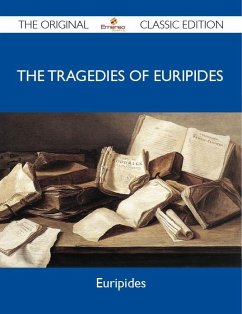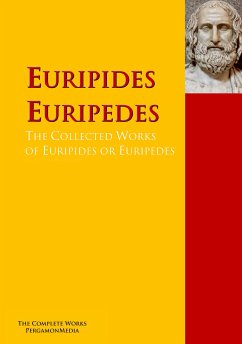
The Tragedies of Euripides - The Original Classic Edition (eBook, ePUB)

PAYBACK Punkte
2 °P sammeln!
Finally available, a high quality book of the original classic edition of The Tragedies of Euripides. This is a new and freshly published edition of this culturally important work by Euripides, which is now, at last, again available to you. Enjoy this classic work today. These selected paragraphs distill the contents and give you a quick look inside The Tragedies of Euripides: I am present, having left the secret dwellings of the dead and the gates of darkness, where Pluto has his abode apart from the other Gods, Polydore the son of Hecuba the daughter of Cisseus,[1] and Priam my sire, who whe...
Finally available, a high quality book of the original classic edition of The Tragedies of Euripides.
This is a new and freshly published edition of this culturally important work by Euripides, which is now, at last, again available to you.
Enjoy this classic work today. These selected paragraphs distill the contents and give you a quick look inside The Tragedies of Euripides:
I am present, having left the secret dwellings of the dead and the gates of darkness, where Pluto has his abode apart from the other Gods, Polydore the son of Hecuba the daughter of Cisseus,[1] and Priam my sire, who when the danger of falling by the spear of Greece was threatening the city of the Phrygians, in fear, privately sent me from the Trojan land to the house of Polymestor, his Thracian friend, who cultivates the most fruitful soil of the Chersonese, ruling a warlike people with his spear.[
...For it is said that it has been decreed in the full council of the Greeks to make thy daughter a sacrifice to Achilles: for you know how that having ascended oer his tomb, he appeared in his golden arms and restrained the fleet ships, as they were setting their sails with their halliards, exclaiming in these words; Where speed ye, Grecians, leaving my tomb unhonored!
... And the strength of the arguments urged on either side was in a manner equal, till that subtle adviser, that babbling knave,[5] honeyed in speech, pleasing to the populace, that son of Laertes, persuades the army, not to reject the suit of the noblest of all the Greeks on account of a captive victim, and not to put it in the power of any of the dead standing near Proserpine to say that the Grecians departed from the plains of Troy ungrateful to the heroes who died for the state of Greece.
...But he said, O son of Peleus, O my father, accept these libations which have the power of soothing, and which speed the dead on their way; and come, that thou mayest drink the pure purple blood of this virgin, which both the army and myself offer unto thee; but be propitious to us, and grant us to weigh anchor, and to loose the cables of our ships, and to return each to his country, having met with a prosperous return from Troy.
...Surely you will obtain an evil report among the citizens, if, for the sake of an old man, a mere tomb,[5] one who is nothing, as one may say, and of these children, you will put your foot into a mess;[6] you will say, at best, that you shall find, at least, hope; and this too is at present much wanting; for these who are armed would fight but ill with Argives if they were grown up, if this encourages your mind, and there is much time in the mean while in which ye may be destroyed; but be persuaded by me, giving nothing, but permitting me to lead away my own, gain Mycenæ.
This is a new and freshly published edition of this culturally important work by Euripides, which is now, at last, again available to you.
Enjoy this classic work today. These selected paragraphs distill the contents and give you a quick look inside The Tragedies of Euripides:
I am present, having left the secret dwellings of the dead and the gates of darkness, where Pluto has his abode apart from the other Gods, Polydore the son of Hecuba the daughter of Cisseus,[1] and Priam my sire, who when the danger of falling by the spear of Greece was threatening the city of the Phrygians, in fear, privately sent me from the Trojan land to the house of Polymestor, his Thracian friend, who cultivates the most fruitful soil of the Chersonese, ruling a warlike people with his spear.[
...For it is said that it has been decreed in the full council of the Greeks to make thy daughter a sacrifice to Achilles: for you know how that having ascended oer his tomb, he appeared in his golden arms and restrained the fleet ships, as they were setting their sails with their halliards, exclaiming in these words; Where speed ye, Grecians, leaving my tomb unhonored!
... And the strength of the arguments urged on either side was in a manner equal, till that subtle adviser, that babbling knave,[5] honeyed in speech, pleasing to the populace, that son of Laertes, persuades the army, not to reject the suit of the noblest of all the Greeks on account of a captive victim, and not to put it in the power of any of the dead standing near Proserpine to say that the Grecians departed from the plains of Troy ungrateful to the heroes who died for the state of Greece.
...But he said, O son of Peleus, O my father, accept these libations which have the power of soothing, and which speed the dead on their way; and come, that thou mayest drink the pure purple blood of this virgin, which both the army and myself offer unto thee; but be propitious to us, and grant us to weigh anchor, and to loose the cables of our ships, and to return each to his country, having met with a prosperous return from Troy.
...Surely you will obtain an evil report among the citizens, if, for the sake of an old man, a mere tomb,[5] one who is nothing, as one may say, and of these children, you will put your foot into a mess;[6] you will say, at best, that you shall find, at least, hope; and this too is at present much wanting; for these who are armed would fight but ill with Argives if they were grown up, if this encourages your mind, and there is much time in the mean while in which ye may be destroyed; but be persuaded by me, giving nothing, but permitting me to lead away my own, gain Mycenæ.
Dieser Download kann aus rechtlichen Gründen nur mit Rechnungsadresse in A, D ausgeliefert werden.













